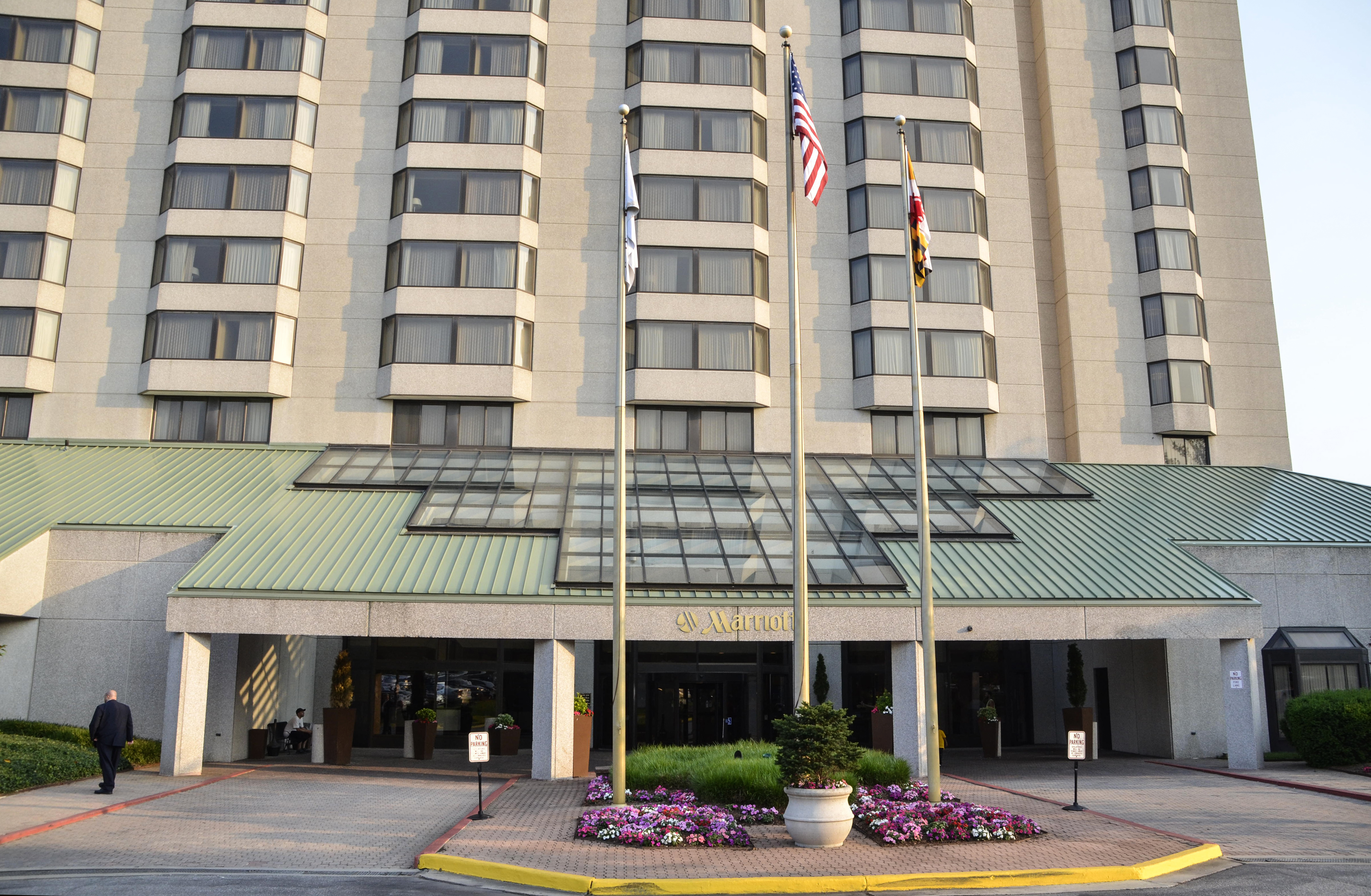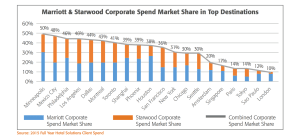Marriott's new mega deal is terrible for consumers
Say goodbye to competition in hotel markets


A free daily email with the biggest news stories of the day – and the best features from TheWeek.com
You are now subscribed
Your newsletter sign-up was successful
If you travel even occasionally, the chances of ending up under a Marriott-owned roof just went way up.
On Tuesday, Marriott got final approval from international regulators to buy Starwood Hotels and Resorts. The $13.6 billion deal will reportedly combine the two rivals into the world's largest hotel company: a 30-brand behemoth overseeing 1.1 million hotel rooms and at least 75 million guests in their loyalty programs alone.
A study by the business travel consultancy CWT Solutions group laid out how the merger could reshape global hotel markets: In Minneapolis, the combined Marriott-Starwood mothership will control half of all hotel spending. It will control 48 percent in Mexico City and 46 percent in Los Angeles and Philadelphia. It will even double its control in markets where it has a smaller presence, like Paris and Tokyo.
The Week
Escape your echo chamber. Get the facts behind the news, plus analysis from multiple perspectives.

Sign up for The Week's Free Newsletters
From our morning news briefing to a weekly Good News Newsletter, get the best of The Week delivered directly to your inbox.
From our morning news briefing to a weekly Good News Newsletter, get the best of The Week delivered directly to your inbox.
"In 14 of the world's top 20 cities, the new hotel group will have nearly a third of the corporate travel hotel spend, rising to half in some places," CWT wrote.

(Graph courtesy of CWT Solutions.)
Here in America, while certain parts of the country are still struggling, demand and economic growth have returned to many of the major cities that are the hotel industry's biggest markets. "With daily room rates and occupancy levels at all-time highs in many major markets, basic economics dictate that less competition will only lead to even higher prices... especially in markets with limited options," the report continued.
This is bad news for consumers, needless to say.
A free daily email with the biggest news stories of the day – and the best features from TheWeek.com
The more one company controls all the competitors in one particular market — like half the hotels in Minneapolis — the closer it gets to wielding monopoly power. Competition forces down prices because it provides cheaper options to consumers, but it also makes companies spend more on labor and investment, so they can keep attracting new customers. Conversely, the closer a company gets to monopoly power, the more leverage it has to jack up prices without offering anything new to attract customers.
Some observers analogize the impending Marriott-Starwood merger to the recent spate of mergers in the airline industry, which is widely agreed to have driven up fares. After United Airlines bought Continental, for example, it owned 40 percent of the airline market at San Francisco International, 55 percent at Newark Liberty International, 35 percent at Chicago O'Hare International, and a whopping 64 percent at Houston Intercontinental.
Another problem with rising monopoly power is that it discourages innovation.
There tends to be a natural lifecycle to any business venture: When a new company invents a good or service, it can remake an existing market or create one from scratch. The company then has monopoly power by definition. That's fine, in a way, because the opportunity to dominate a market incentivizes innovation. But, eventually, other players will copy it and pour into the new market. When that happens, the job of all the players in the market becomes beating the competition through efficiency, effectiveness, or price-cutting.
Needless to say, neither Marriott or Starwood are startups; they're clearly on the latter stage of that lifecycle, when monopoly power should be decreasing, not increasing. So by stifling competition in the hotel market, their merger could have consequences for the quality of the many services they provide. Starwood, for example, has a loyalty program that's widely considered to be one of the best in the business. The Points Guy — a website that rates hotel loyalty programs and credit cards and such — rated Starwood's program as worth 2.5 cents for every 0.7 cents of Marriott's. Starwood's loyalty program "is credited with forcing other hotel groups — and Marriott in particular — to improve their versions just to compete," The Economist reported. With Marriott and Starwood now the same company, it's hard to see how Marriott or Starwood will continue to feel such pressure.
There's also the matter of third-party online travel agents like Expedia and Priceline. They've been a boon for consumers, but a thorn in the side of hotel chains, who want to gather their own consumer data to better market themselves online. The new Marriott-Starwood behemoth could spark a market war between the two industries, as the hotel chain tries to corral customers away from the online bookers, who will likely retaliate by shoving Marriott-Starwood and other headline brands lower in the search results.
The upside is that the market war could cancel out the temptations of monopoly power. Customers don't get any loyalty program points when they use third-party websites to book rooms, so upping the appeal of the loyalty program might be the best way to circumvent Expedia and Priceline and their ilk. The downside is that the Marriott-Starwood chain might be so big that it could just let the loyalty program wither, safe in the knowledge that people will have to stay in their hotels anyway.
Travelers: Pray it doesn't come to that.
Jeff Spross was the economics and business correspondent at TheWeek.com. He was previously a reporter at ThinkProgress.
-
 ‘Restaurateurs have become millionaires’
‘Restaurateurs have become millionaires’Instant Opinion Opinion, comment and editorials of the day
-
 Earth is rapidly approaching a ‘hothouse’ trajectory of warming
Earth is rapidly approaching a ‘hothouse’ trajectory of warmingThe explainer It may become impossible to fix
-
 Health insurance: Premiums soar as ACA subsidies end
Health insurance: Premiums soar as ACA subsidies endFeature 1.4 million people have dropped coverage
-
 The pros and cons of noncompete agreements
The pros and cons of noncompete agreementsThe Explainer The FTC wants to ban companies from binding their employees with noncompete agreements. Who would this benefit, and who would it hurt?
-
 What experts are saying about the economy's surprise contraction
What experts are saying about the economy's surprise contractionThe Explainer The sharpest opinions on the debate from around the web
-
 The death of cities was greatly exaggerated
The death of cities was greatly exaggeratedThe Explainer Why the pandemic predictions about urban flight were wrong
-
 The housing crisis is here
The housing crisis is hereThe Explainer As the pandemic takes its toll, renters face eviction even as buyers are bidding higher
-
 How to be an ally to marginalized coworkers
How to be an ally to marginalized coworkersThe Explainer Show up for your colleagues by showing that you see them and their struggles
-
 What the stock market knows
What the stock market knowsThe Explainer Publicly traded companies are going to wallop small businesses
-
 Can the government save small businesses?
Can the government save small businesses?The Explainer Many are fighting for a fair share of the coronavirus rescue package
-
 How the oil crash could turn into a much bigger economic shock
How the oil crash could turn into a much bigger economic shockThe Explainer This could be a huge problem for the entire economy
